By: Arthur Magero Abonyo MA,
Molo and Kuresoi are sub-counties located at the heart of the expansive Kenyan section of the Rift Valley. This territory has suffered from decades of interethnic conflict. This conflict is associated with irregular land tenure systems and deep-seated ethnic animosities that have historically been associated with irregular land allocation. Similarly, the Indigenous ethnic community has always taken centre stage in influencing people’s participation in politics. Seasons of electoral politics have most of the time been characterized by forced migrations targeting ethnic groups that are considered to be immigrants and, therefore, bearing no voting rights in a territory that was not ancestrally theirs.
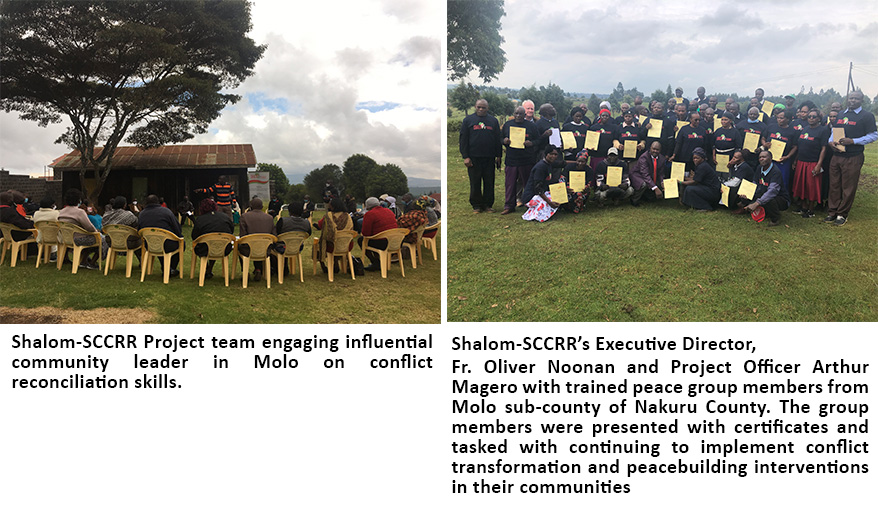
In the year 2017, Shalom-SCCRR was invited by the local religious and government leadership to intervene and support the communities in putting in place a mechanism that would be utilized by them in the long term to transform the existing underlying issues that have contributed to the causes and persistence of interethnic violence. In response, Shalom designed an intervention that targeted various manifest and structural conflict issues. These included marginalization and ethno-politics which often escalated during the electoral periods, land and boundary disputes, historical injustices, rampant livestock theft, frequent cases of tribal/ethnic clashes, intolerance of cultural differences, and deep-seated interethnic mistrust.
Shalom-SCCRR’s program focused on assisting the communities to improve their conflict analysis capacities as a basis for identifying and targeting the strategic, structural, and environmental factors that underly the recurrence of interethnic violence as distinct to just attending to the proximate and the trigger causes. Additionally, the transformative methodology focused on equipping the communities with the ability to transform their personal, relational, cultural, and structural dimensions that entrench interethnic mistrust and consequently escalate violent conflict. The analytical and transformation capacities were meant to enable the opinion shapers to initiate joint problem-solving initiatives, work together towards a reconciled co-existence, and jointly establish and protect development initiatives.
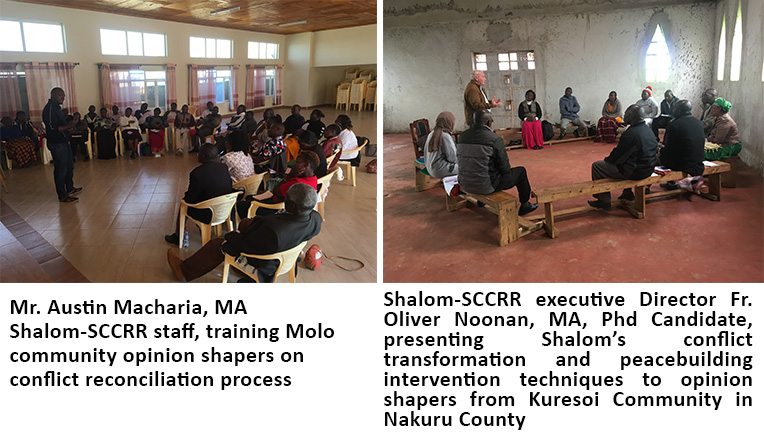
The Shalom-SCCRR’s comprehensive approach has delivered significant transformation to the influential opinion shapers and the community at large by enhancing the local capacities to resolve both manifest and structural violence conflicts. Moreover, this transformative methodology has transformed the beneficiaries’ attitudes and behaviors hence nurturing self-awareness and empathy among them. Furthermore, their relationships with the ethnic other have been restored as they are freely communicating and cooperating in addressing any emerging threats that stand to derail the gains made.
Mrs. Joyce Wanjiku an Assistant chief in Ikumbi sub-location of Temoyetta location in Nyota ward in Kuresoi sub-county noted that, “the in-depth training provided by Shalom-SCCRR for seven years has enabled us to rise above the divisive politics as we are now focused on building community cohesion. The conflict transformation and peacebuilding training have been of great significance in transforming our approach to political disputes and enhancing our relationship to be a more unified community when facing our challenges. I kindly request Fr. Patrick Devine and Fr. Oliver Noonan to pass our heartfelt regards and deep appreciation to all Shalom-SCCRR donors, friends and supporters worldwide. Their contributions made a significant difference to the people of Molo, Kuresoi and many other places that Shalom works.
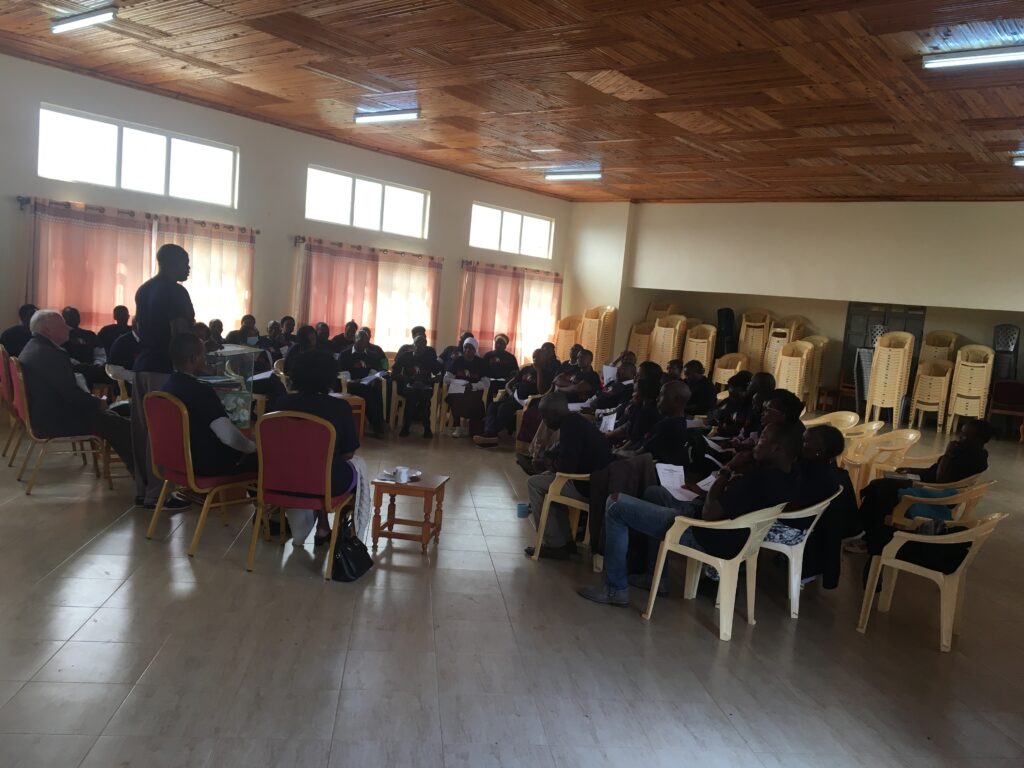
Since the project’s inception, Shalom SCCRR has conducted 87 conflict transformation and peacebuilding training workshops equipping 3,604 influential local peace actors (1,954 male and 1,650 women) with peacebuilding skills and conflict resolution techniques. Through these trainings, the influential opinion shapers have become a resource by initiating interethnic reconciliation activities. Additionally, they have taken the lead in applying their skills to resolve conflicts in their latent stages that threatened to degenerate into fierce destructive behavioural violence. Over the seven years, the trained opinion shapers have directly conducted 51 interethnic problem-solving and conflict reconciliation awareness forums in different locations within the Molo-Kuresoi project area. Shalom believes in empowering the community to be the architects of their interdependent future of peaceful coexistence.
After seven years of Shalom-SCCRR’s conflict transformation, peacebuilding and school/educational development intervention initiatives, communities in Molo and Kuresoi are grateful for the methodology used by Shalom. The communities also attest to the multiple outcomes and impacts they benefit from courtesy of Shalom’s project. Mr. Benson Mwangi Titus a trained Shalom Community group animator alludes that,
“We are grateful of Shalom-SCCRR approach, you have transformed our communities by empowering us with knowledge and skills in conflict transformation and peacebuilding, this has contributed to a significant impact in mitigating any tension and violent ethnic conflict that were entrenched among the communities. When Shalom started working here, the deep-seated ethnic hatred at that time led to the establishment of a mental boundary between our communities that was commonly called the cut-line. The consequences of crossing this cut-line could be dire if one was found in the territory of the opposite ethnic group hence people stayed clear of the cut-line. It is because of Shalom-SCCRR that we now feel empowered and ready to forge a future defined by peace and collaboration as we thrive in our restored collective trust and relationships. The cut-line has been deconstructed and we can now move freely.”
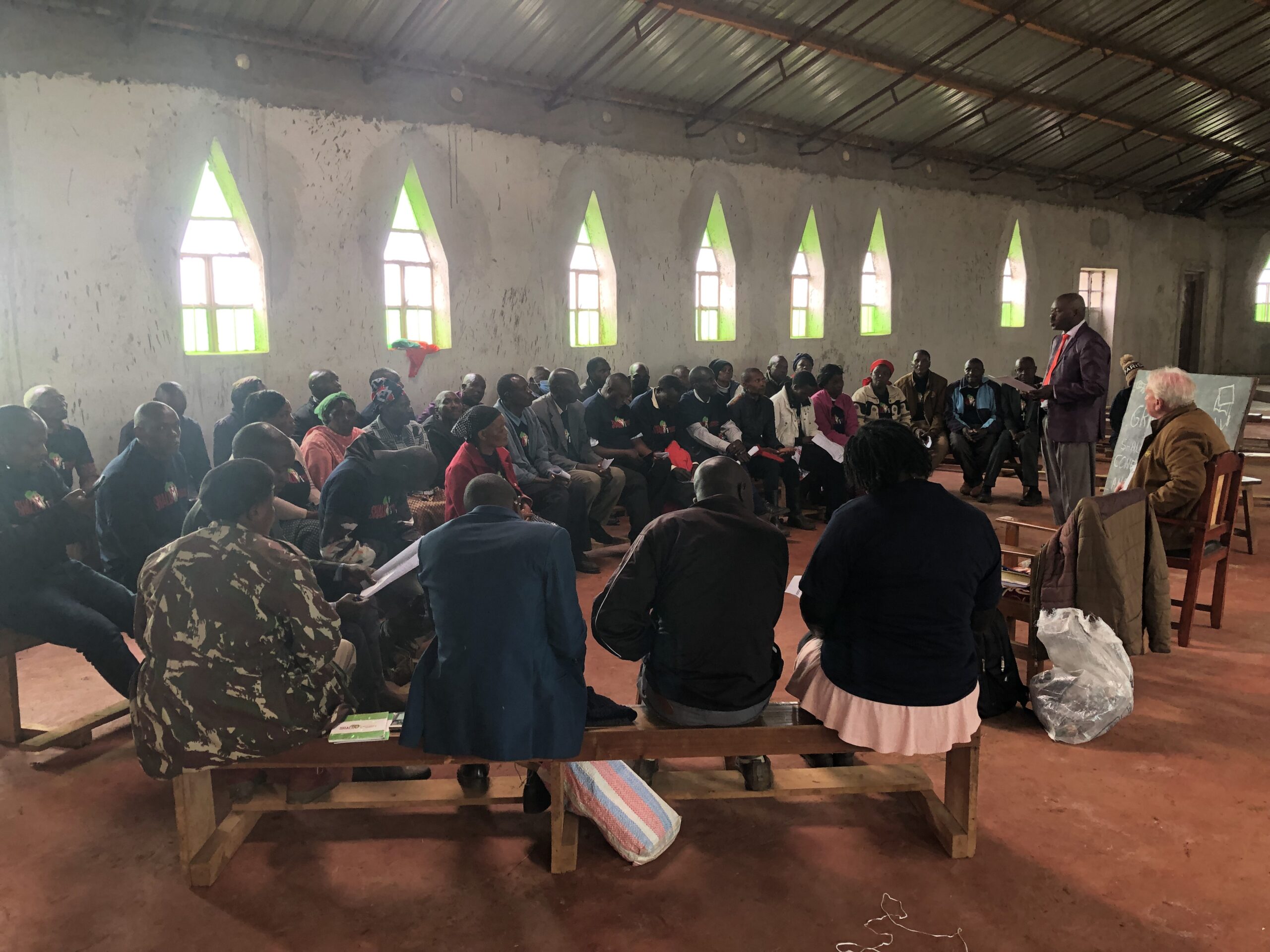
Accordingly, the Shalom-SCCRR approach has enabled the ethnic communities in Molo and Kuresoi to tackle the root causes of their conflict independently. Mr. Wycliffe Mutiso, a trained Shalom community facilitator, thanked Shalom as he observed that “the trainings by Shalom have equipped us with the skills and we now have the confidence needed to guide our communities towards lasting peace. We are now a network of well-trained peace ambassadors, and whatever we have learned is an investment in us, as we need to use it forever in sustaining the peacebuilding process.
Furthermore, over the seven years, Shalom has also integrated peace education to schools in Molo and Kuresoi, and this has helped in fostering a culture of peace among the pupils and students who will form the future generations. Lucy King’ata, a peace club member at Kimkasa Primary School, thanked Shalom as she remarked that the peace education classes we have been attending have enriched our learning environment. Before Shalom introduced the peace education curriculum in our schools, we used to look at each other on tribal and ethnic lines, but after the trainings we have realized that we need to see each other as one, and this we have spread to the community.
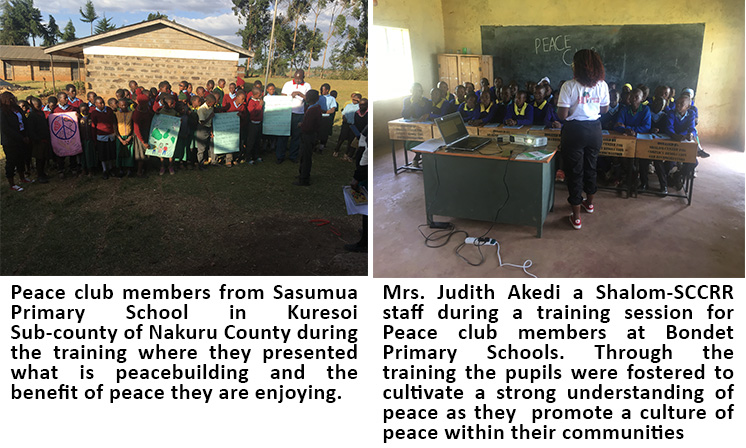
Through institutional infrastructural development programs, Shalom-SCCRR provided support to more than 13 schools that lacked basic infrastructure, teaching and learning materials among other educational needs. The support has benefitted more than 11,000 pupils and students in Molo and Kuresoi.
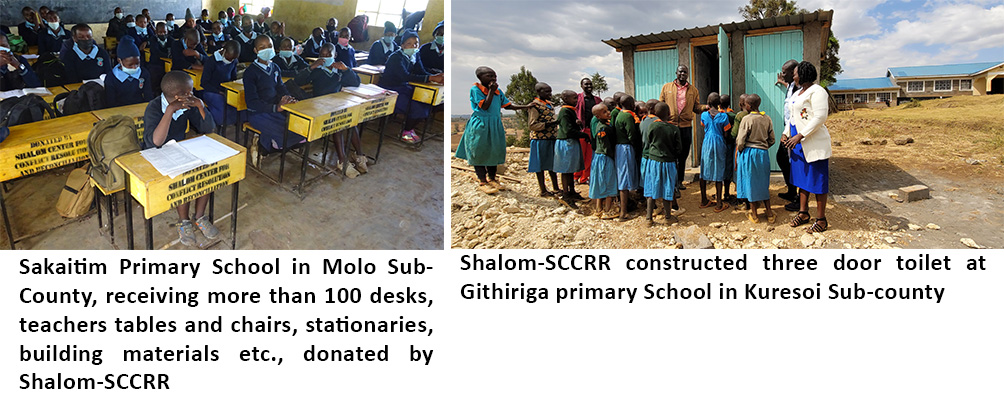
Madam Alice Obiero a head teacher of Matumaini Integrated primary school supported by Shalom remarked, “among other material support, we now for instance can store water and we have clean water for drinking for learners. This has reduced cases of communicable diseases as learners can now frequently wash their hands. This has improved attendance in school and many retained in school as they have no worries of carrying water from home to the school. We really thank Fr. Patrick Devine, Fr. Oliver Noonan and all Shalom donors, for their generous support and contribution which have brought a significant change to our schools in Molo and Kuresoi.
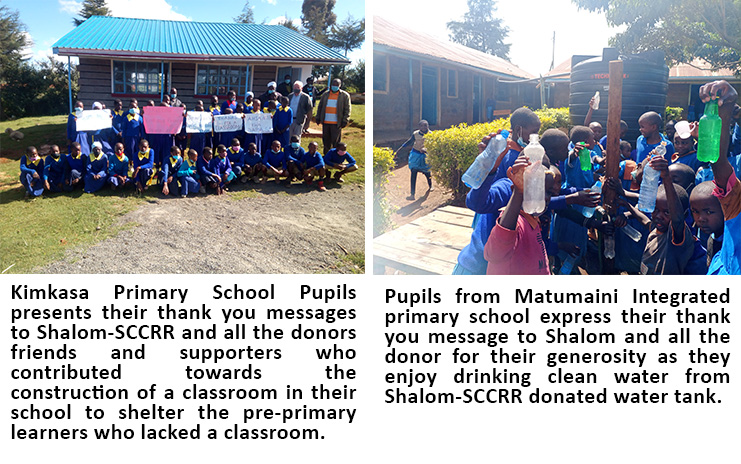
The Impact of the Shalom-SCCRR transformative peacebuilding initiative is benefiting tens of thousands of people in Molo and Kuresoi. Ms. Anne Nyokabi Kariuki a trained Shalom community animator joyfully thanked Shalom-SCCRR’s Management led by Fr. Patrick Devine, Fr. Oliver Noonan and the entire Shalom team for their significant impact remarking that, Shalom’s intervention in Molo and Kuresoi has made remarkable change into our lives, towards achieving positive peace. This has enhanced interaction and collaboration among ethnic communities that are living in these two sub-counties. She testified by saying, my family and I were victims of the 2007 Post Election Violence, but the Shalom unique methodology of intervention has indeed brought trauma healing into our lives. I can vividly remember some of us cried when we were training communities during forums on reconciliation and peace circles. After doing series of these trainings, I started feeling a change… a kind of acceptance, self-rediscovery, a special awareness … a process that actually turned to be therapeutic, transformative and ultimately healing and therefore today I’m an ambassador of peace and I hope I can reach to many… many more.
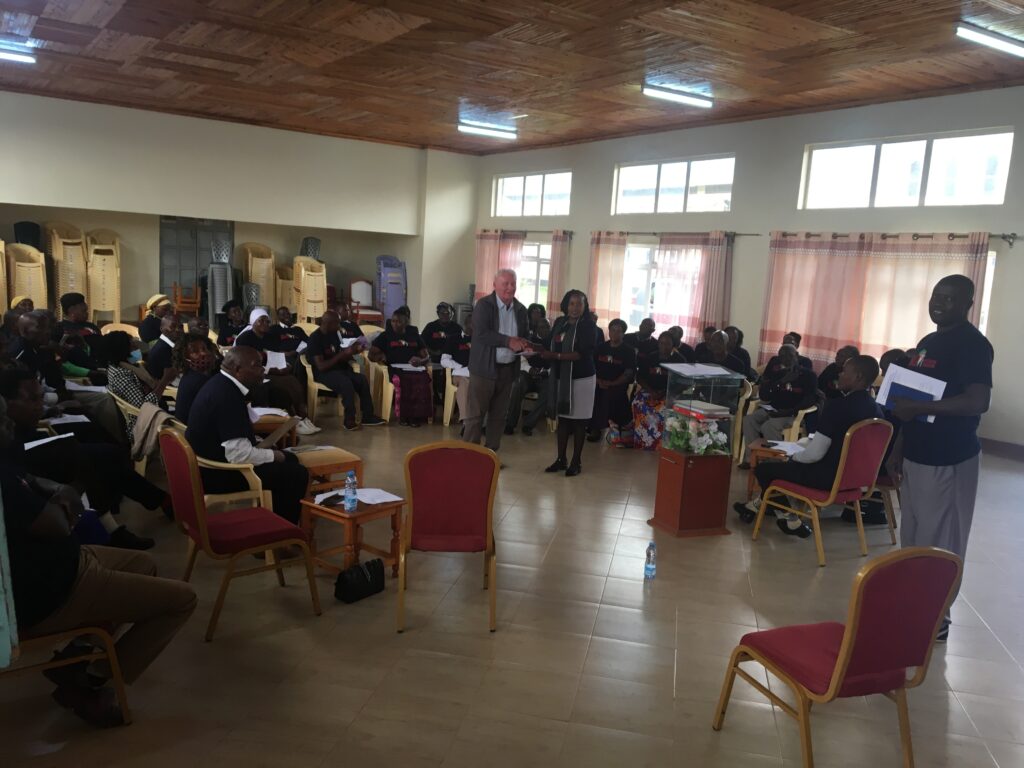
Mr. Jeremiah Mararo Mwaura a head teacher at Kimkasa Primary school, noted that today our schools are now function uninterrupted and the intervention by Shalom has transformed our schools into centers of learning and peace. Furthermore, the support we have received from Shalom has created a stable and conducive educational environment for learners in our schools that were affected by ethnic violence and displacement of families in 2007/2008 Post Election Violence. As school community we sincerely thank the Shalom donors for their generous contribution that has brought this transformation to our schools.
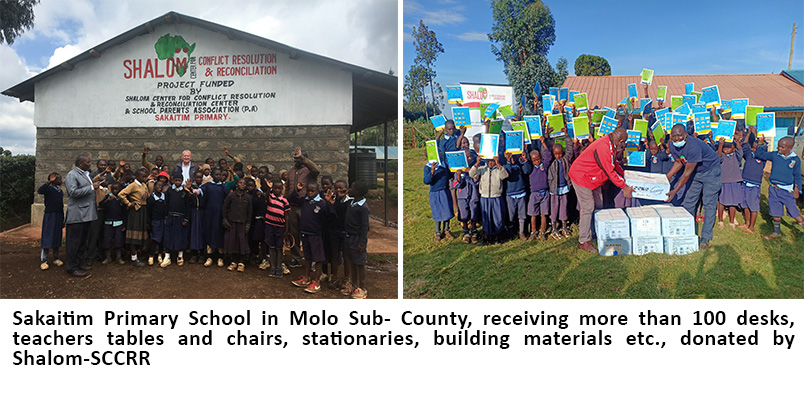
Mrs. Lydia Maritim a trained opinion shaper, expressed her appreciation to Shalom, by attesting that, the transformative work by Shalom has enabled us to freely engage in joint participatory reconciliation forums which have promoted trust and cooperation among ethnic communities in Molo and Kuresoi.
The Assistant County commissioner of Molo Sub-county Mr. Felix Chessa, appreciated the contributions made by Shalom in training Community Resource Persons and peace groups who are now an essential pillar in raising awareness, promoting peace, and sustainable development within Molo and Kuresoi. We are grateful of Shalom’s work which has further contributed to the successful resettlement of some displaced families in recent years.
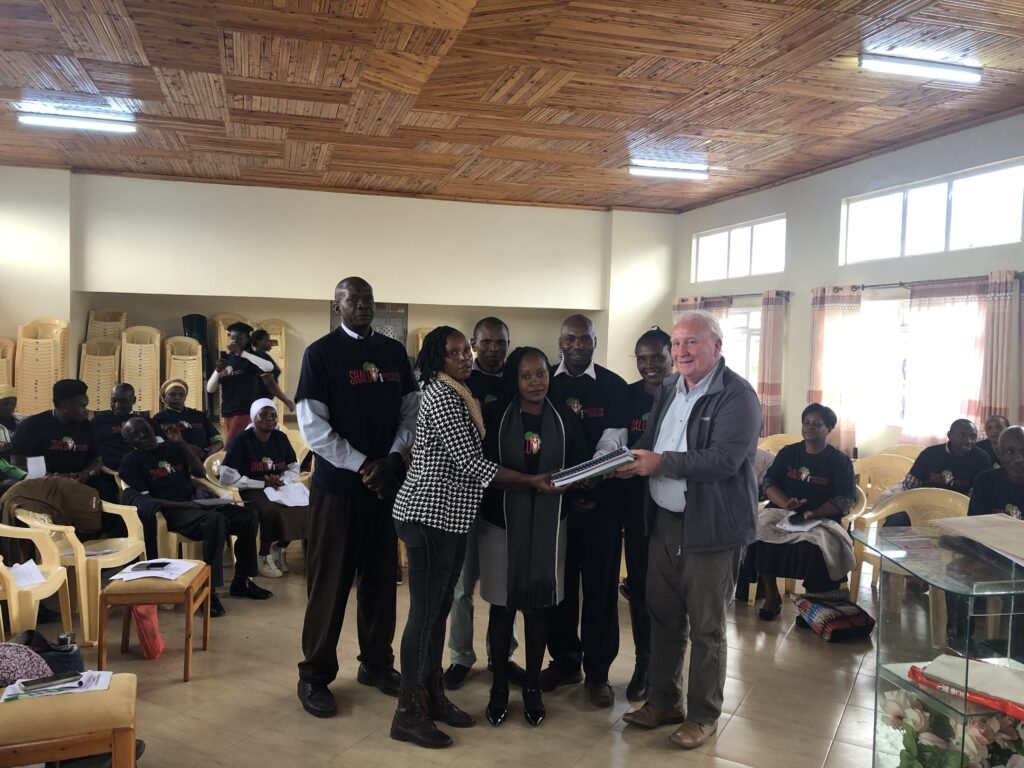
Mr. George Mecha a trained Shalom lead community facilitator, commented that, the reduction in violence and cases of livestock theft is a testament to the effectiveness of Shalom’s approach. Their interventions have brought about tangible improvements in our daily lives as it has enhanced interactions and reduced ethnic tensions that has brought cohesiveness among communities living in Molo and Kuresoi. We thank Rev. Dr. Patrick Devine, Fr. Oliver Noonan, all Shalom donors, friends, supporters worldwide and the entire Shalom team for their profound impact. Their generous contributions and efforts have resulted to this significant and lasting changes in these communities that were conflict-affected.
In conclusion Shalom Community Peace Initiative showcases the potential for conflict resolution and peacebuilding. Kuresoi and Molo’s successes highlight the significance of consistent support and involvement of the community in peace initiatives. Shalom-SCCRR, its partners, and the local community’s dedication have been instrumental in achieving lasting harmony and development in place that were prone to conflict. Indeed, Shalom-SCCRR’s conflict transformation and peacebuilding approach are the roadmap to reconciliation, overcoming manifest and structural violence.
Author:
Arthur Magero Abonyo MA, Project Officer & Team Leader Nakuru Project
Relevant Links:
- Shalom-SCCRR. (2024). 2023 Shalom-SCCRR Results and Achievements. https://shalomconflictcenter.org/wp-content/uploads/2024/01/2023-Peacebuidling-Conflict-Transformation.pdf
- Shalom-SCCRR. (2024). 2009-2023 Shalom-SCCRR Results and Achievements. https://shalomconflictcenter.org/wp-content/uploads/2024/05/14-Years-of-Shalom-SCCRR-2009-2023-LV-Full-Report.pdf
- Shalom-SCCRR. (2024). 2023 Shalom-SCCR School/Educational Developments Results and Achievements. https://shalomconflictcenter.org/2023-shalom-sccrr-school-educational-developments-results-and-achievements/.
- Noonan, O., Okoth G., & Kibe, E. (2024). The Intergovernmental Agency for Development (IGAD) and Shalom Center for Conflict Resolution and Reconciliation (SCCRR): MoUs Operationalized in Peace and Development. https://shalomconflictcenter.org/the-intergovernmental-agency-for-development-igad-and-shalom-center-for-conflict-resolution-and-reconciliation-sccrr-mous-operationalized-in-peace-and-development/
- Butler, J. (Oct, 2023). Harvard Kennedy School; A Conversation with Rev. Dr. Patrick Devine and Paula Soumaya Domit. https://shalomconflictcenter.org/wp-content/uploads/2024/01/Harvard_Kennedy_School_Article_WITH_PHOTOS_MAP_1_17_24_FINAL.pd
- Wamae, J. (2020). Briefing Paper No. 10: An Analysis of the Land and Boundary Related Disputes in Nakuru County. https://shalomconflictcenter.org/briefing-paper-no-10/
- Abonyo, A, M. (2022). Molo and Kuresoi; Community leaders on a joint mission towards promoting tolerance and inclusivity amidst emerging violent situations. https://shalomconflictcenter.org/community-leaders-on-a-joint-mission-towards-promoting-tolerance-and-inclusivity-amidst-emerging-violent-situations-in-molo-and-kuresoi/
- Abonyo, A, M. & Shalom-SCCRR Communications Dept. (2021). Shalom-SCCRR Contributing to School Infrastructural Development amidst Inter-Ethnic Political Violence in Kuresoi, Nakuru County-Kenya. https://shalomconflictcenter.org/shalom-sccrr-contributing-to-school-infrastructural-development-amidst-inter-ethnic-political-violence-in-kuresoi-nakuru-county-kenya/
- Wamae, J. & Abonyo, A, M. (2019). Shalom Interventions and Results; Transforming and Healing Wounds of Ethnic Conflict in Molo and Kuresoi, Kenya. https://shalomconflictcenter.org/shalom-interventions-and-results-transforming-and-healing-wounds-of-ethnic-conflict-in-molo-and-kuresoi-kenya/
- Mwangi, F. (2018). SCCRR’s Participatory Peacebuilding Strategy in Nakuru County. https://shalomconflictcenter.org/sccrrs-participatory-peacebuilding-strategy-in-nakuru-county/
- McGinley, C. (2017). Experiencing Shalom’s Empowerment of People in their Preparation for Elections in Kenya 2017. https://shalomconflictcenter.org/experiencing-shaloms-empowerment-of-people-in-their-preparation-for-elections-in-kenya-2017/
- Mwangi, F. (2017). Conducting an Evaluation of Activities in Nakuru County. https://shalomconflictcenter.org/conducting-an-evaluation-of-activities-in-nakuru-county/
- Mwangi, F. (2016). Empowering Nakuru Communities to Achieve Peaceful Coexistence. https://shalomconflictcenter.org/empowering-nakuru-communities-to-achieve-peaceful-coexistence/
- Serem, R. (2015). Enhancing Peace through Education and Development in Nakuru. https://shalomconflictcenter.org/enhancing-peace-through-education-and-development-in-nakuru/

